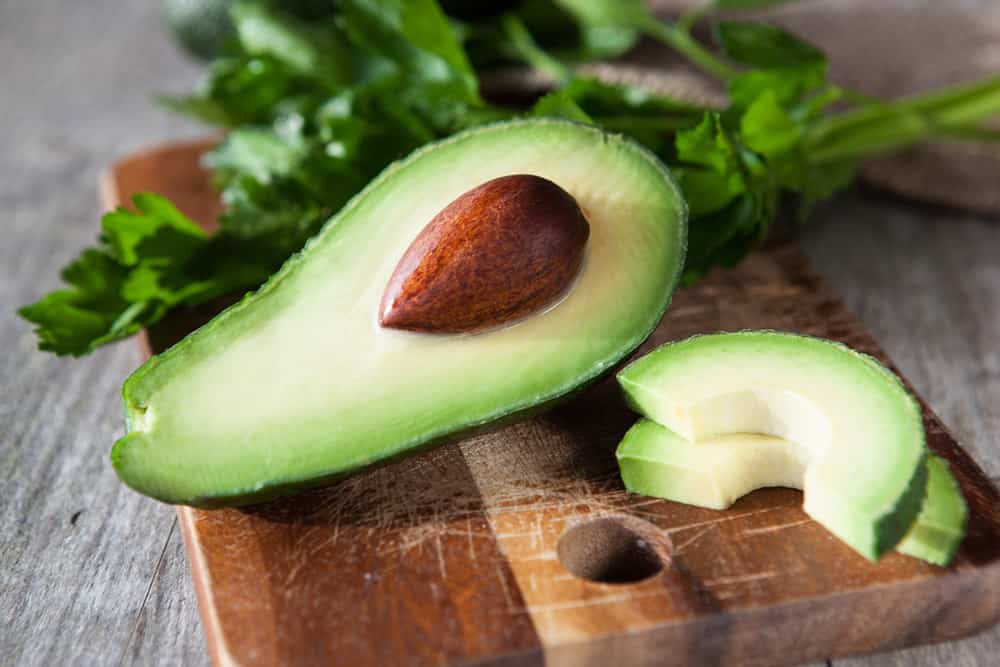Avocado Facts:

Nutrition Facts
Serving Size 1 Fruit
Servings Per Container 1
Amount Per Serving
Calories 322
Calories from Fat 261
% Daily Value*
Total Fat 29g
45%
Saturated Fat 4g
20%
Trans Fat 0g
Cholesterol 0mg
0%
Sodium 14mg
1%
Total Carbohydrate 17g
6%
Dietary Fiber 13g
52%
Sugars 1g
Protein 4g
Vitamin A
6%
Vitamin C
33%
Calcium
2%
Iron
6%
Vitamin E
21%
Vitamin K
53%
Thiamin
9%
Riboflavin
15%
Niacin
17%
Vitamin B6
26%
Folate
41%
Pantothenic Acid
28%
Magnesium
15%
Phosphorus
10%
Potassium
28%
Zinc
9%
Copper
19%
Manganese
14%
Selenium
1%
*Percent Daily Values are based on a 2,000 calorie diet. Your daily values may be higher or lower depending on your calorie needs.
PQ (Protein Quality) x PDCAAS (Protein Digestibility Corrected Amino Acid Score) - 98
Additional Contents
- lutein
- zeaxanthin
- carotenoids
- stigmasterol
- beta-carotene
- beta-sitosterol
- alpha-carotene
- beta-cryptoxanthin
- polyunsaturated fat
- monounsaturated fat
- omega-3 (15:1 omega-6 to omega-3)
- omega-6 (15:1 omega-6 to omega-3)
Potential Health Benefits
- promote weight-loss
- digestive health boost
- cardiovascular health boost
- lower "bad" cholesterol
- fight bad breath
- nerve function
- anti-oxidant boost
Potential Athletic Benefits
- Long-term energy production for prolonged endurance events.
- Hydrating electrolytes (more than bananas) to promote muscle contraction and fluid balance for hotter days of exercise.
- Good source of vitamins/minerals to combat common deficiencies from high exercise volume.
- Increase testosterone and growth hormone production for building lean muscle mass.
Glycemic Index Rank
1 out of 100
| Rank | Value |
|---|---|
| Low Glycemic | less than 55 |
Food Sensitivity Rank
0.1 to 1 ratio
| Rank | Value |
|---|---|
| Low for Fructose Sensitivity | less than 1 (fructose to glucose ratio) |
A special fruit indeed. Avocados fight cancer, help protect against CVD (cardiovascular disease), aid in weight-loss, and promote digestive health. In addition, they are a great source for multiple vitamins and minerals. That is why they rein as one of the top foods on our list.

481kcal/serving

275kcal/serving

315kcal/serving

omega-6 to omega-3 ratio
Omega-6 promotes inflammation, vessel constriction, blood clotting, pain, airway constriction and more, while omega-3 promotes anti-inflammatory effects, blood vessel dilation, a decrease in pain, airway dilation, blood cell fluidity (increased hormone communication) and more. This ratio in most individuals is upwards of 16:1 omega-6 to omega-3 causing as you can already understand, predominant effects of inflammation, blood vessel constriction, pain, airway constriction, and more. Both omega's are important, but keep this in mind when planning your next meal. A healthy range for omega-6 to omega-3 is between 4:1 to 1:1.
Sources include: USDA
***All-Body Fitness takes no responsibility for the accuracy of the information provided above. Please contact a medical doctor or a registered dietitian for nutrition advice.

 Fitness
Fitness Nutrition
Nutrition